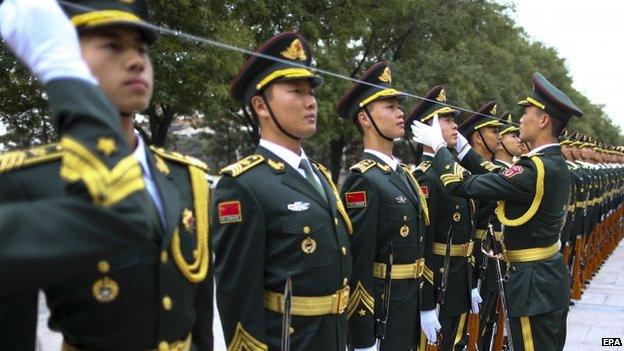China media: Military corruption
- Published

Papers welcome President Xi Jinping's efforts to end corruption in the army
Papers back the government's decision to bring the army's auditing office under the Central Military Commission (CMC) of China.
The auditing office was earlier part of the People's Liberation Army's (PLA) Logistics Department. But now it will be under the CMC headed by President Xi Jinping, state-run Xinhua news agency, external reports.
The decision comes after several high-profile cases of abuse of power among top military officials, including Gu Junshan, former deputy head of the logistics department, and Xu Caihou, former vice-chairman of the CMC.
The news agency explains that the auditing office will now "enjoy more independent and authoritarian status".
Several papers and experts point out that the move will strengthen anti-corruption efforts in the military.
"In the short term, the decision will become a direct effective measure to root out corruption in the army," Liu Qinglong, a legal specialist at Tsinghua University, tells the China Daily, external.
The pundit adds that "the move is a good attempt to stimulate innovations in the army's management".
Echoing similar views, Xie Chuntao, a historian at the Communist Party School, points out that the recent high-profile corruption cases "must be one of the major reasons that promoted the change".
The Haiwai Net, external says the move to keep the auditing work independent is a sign that the military is preparing itself for stronger anti-corruption campaign.
Making similar observations, Mao Zhaohui, an expert on governance affairs with Renmin University of China, expects more such measures to be introduced in the near future.
Apec anti-corruption deal
Elsewhere, papers shine a spotlight on international anti-corruption efforts after the member states of the Asia-Pacific Economic Cooperation (Apec) agreed to increase co-operation to track down corrupt Chinese officials.
According to Xinhua, external, the Beijing Statement on anti-corruption, proposed by China and the US, will be included in the concluding statement of the Apec summit.
Reports say Beijing had sought co-operation from the US, Australia and Canada to help track corrupt Chinese officials.
Commenting on the announcement, the Beijing News, external describes the latest development as a "weapon" in China's hands to fight corruption.
"Once the Apec anti-corruption network is put in place, it will give China a new weapon to fight corruption," it says.
Meanwhile, the China Daily, external reports that the French government has decided to assist China to track down corrupt officials and confiscate illegal assets transferred to France.
India's 'unfriendly gestures'
And finally, some media outlets are criticising India for sending "conflicting signals" to China, and urge Beijing "to be on the alert".
An article in the Chinese edition of the Global Times, external criticises India for showing "unfriendly gestures" towards China.
The commentary, written by a researcher at China Institute of International Studies, notes that Indian PM Narendra Modi has pledged to strengthen ties with China, but "Delhi has been frequently displaying unfriendly gestures towards Beijing".
"India's military has been aggressively patrolling the border regions and building facilities there. It is obvious they are targeted at China," the article says.
"In a rare move, India's foreign minister has also requested Beijing to respect 'One India' policy, which is a blatant attempt at blackmailing and pressurising China," says the article, observing that Delhi is also developing closer ties with Japan and Vietnam.
Last month, the meeting between Vietnamese Prime Minister Nguyen Tan Dung and Mr Modi in Delhi over co-operation in oil exploration in the South China Sea had raised some eyebrows in the Chinese media.
"The real reason (behind the mixed signals) is due to the misjudgement of the India government that Delhi has achieved a higher international status because it is being courted by the US, Japan, Vietnam and China," it says, reminding that India needs the co-operation and support of China to grow.
BBC Monitoring, external reports and analyses news from TV, radio, web and print media around the world. For more reports from BBC Monitoring, click here. You can follow BBC Monitoring on Twitter, external and Facebook, external.